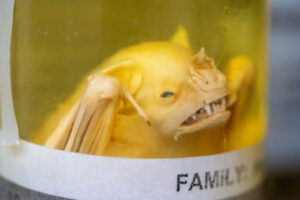
The Collection of Mammals consists of 68,844 representing approximately 994 species, 424 genera, 94 families, and 22 orders. The largest holdings (>40% each) are for the orders Rodentia and Chiroptera. This collection holds 39 holotypes (8 species, 31 subspecies) and 556 paratypes from 40 taxa. Most material was collected within the last 55 years but some specimens date back to the early 1900s. Specimens from the original US Biological Survey made up the original set of specimens for the mammal collection. With Davis as the Department Head and Chief Curator, the collection quickly grew to include specimens from his many field trips to Mexico. Geographically, the collection focuses on material from the southwestern United States, Mexico, and Central America. The majority of these specimens consist of skins and skeletal material prepared by standard museum procedures. Most of these specimens are represented as skins with skulls or as skeletons only; however, approximately 25 years ago, researchers affiliated with this collection began preparing many of their specimens as skins with skulls plus post-cranial material.
The Collection of Mammals continues to grow through field work, funded research projects, and recent agreements with the National Parks System, which designates the Biodiversity Research and Teaching Collections as the official repository for vertebrate specimens from Big Thicket National Preserve, Carlsbad Caverns National Park, Guadalupe Mountains National Park, Padre Island National Seashore, and San Antonio Missions National Historic Park. Specimen records from the collection may be accessed via the VertNet. The genetic material for our specimens is curated in parallel and stored in ultra-cold freezers and is also available to researchers by request. To search for specimens with associated tissues, visit the Global Genomic Biodiversity Network site. Our loan policy is available here.

The Collection of Mammals also provides training ground for students in ECCB 401 Mammalogy that includes not just indoor specimen based labs, but also opportunities to participate in learning field techniques.
The Biodiversity Research and Teaching Collections is willing and able to care for all types of collections. If you collect specimens as part of your research and cannot or do not wish to adequately care for them in the long term, please consider us as a repository. We gratefully accepts the deposit of such specimens provided they are accompanied by proper documentation and permits (USDA, USFWS, CITES, STATE).
Recent Publications
Hafner, D.S., S.A. Neiswenter, J.E. Light, K.L. Hernandez, and B.R. Riddle. 2024. Phylogeography, systematics, and conservation status of pocket mice (Chaetodipus) of the Sonoran-Sinaloan thorn forest. Journal of Mammalogy 105(3): 543-562
Hamilton, N.M., K. Sanchez, M.L. Moran, R.E. Sherwin, J.E. Light, and M.L. Morrison. 2024. Genetic variation and population structure among western hibernacula of Townsend’s big-eared bats, Corynorhinus townsendii townsendii. Western North American Naturalist 84:342-355.
Mosley, I.A., L.D. Auckland, J.E. Light, and S.A. Hamer. 2024. Apparent absence of Trypanosoma cruzi in Mexican free-tailed bats (Tadarida brasiliensis) from Texas, USA. Veterinary Parasitology: Regional Studies and Reports 51: 101031.

